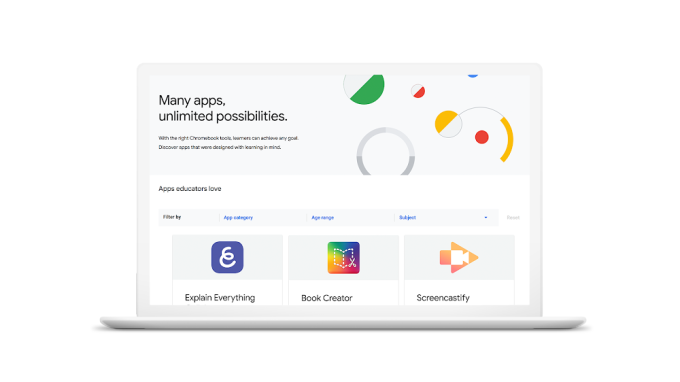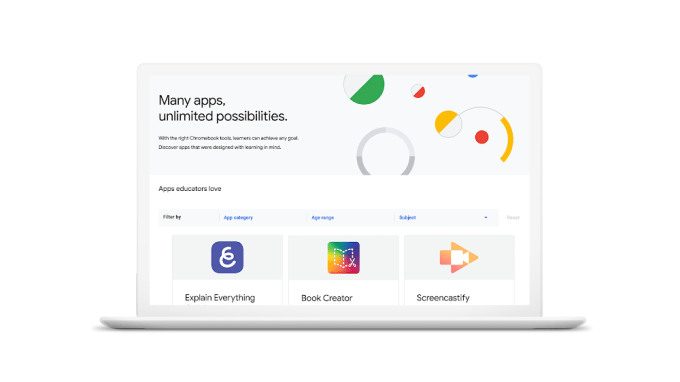
Google today announced an expansion of its educational initiatives with the Chromebook App Hub from Google for Education, due to launch later in 2019. The new resource is designed to offer teachers and other curriculum administrators an easier, more centralized means of finding the appropriate educational tools and apps they can use in the classroom.
Teachers often surf the web to find ideas and activities to help them with their lesson plans, while the school’s IT and other curriculum specialists regularly field app requests from teachers, but have to ensure the programs the teachers want to use are allowed by the district’s policies, explains Google.
Meanwhile, the companies that build edtech applications want to be able to reach teachers and educators to tell them about their software solutions.
That’s where the Chromebook App Hub would come in. But unlike a traditional app marketplace that offers only a searchable list of apps to try, the App Hub aims to show in a more concrete fashion how the apps can be used in the classroom.
Google says it worked with the EdTechTeam and other educators to author what it’s calling “idea sparks” — which are examples of how apps can be used, along with tips, differentiated instruction strategies and links to more resources that can help, like videos, activities and useful websites. The idea here is to provide more than a set of apps to choose from, but to offer a complete set of tools and information needed to actually put the apps to work in the classroom by allowing educators to learn from one another.
 “In my experience, teachers learn about applications in two ways: learning about a new lesson idea that has the app integrated into it, or hearing about an app that sounds awesome and want to get ideas about how to use it,” explained Kate Petty, the director of Educational Learning at EdTechTeam, in an announcement. “Idea Sparks give teachers an opportunity to learn about new idea sparks and, even better, will provide an opportunity for teachers to share what they have created,” she said.
“In my experience, teachers learn about applications in two ways: learning about a new lesson idea that has the app integrated into it, or hearing about an app that sounds awesome and want to get ideas about how to use it,” explained Kate Petty, the director of Educational Learning at EdTechTeam, in an announcement. “Idea Sparks give teachers an opportunity to learn about new idea sparks and, even better, will provide an opportunity for teachers to share what they have created,” she said.
Google also worked with the nonprofit Student Data Privacy Consortium (SDPC) to help app developers better consider the data privacy aspects of their products. This way, districts can search the App Hub for those solutions that match up with their own data privacy requirements.
The App Hub can also be searched and filtered by the idea category, subject, age range and learning goal.
The launch of App Hub, which is expected for later in the year, follows a series of moves by Google that focus on bringing to the classroom its Chromebook platform, tools and services — whether that’s upgraded devices designed for classroom use, or its browser-based software for teachers, like Classroom, Forms and Quizzes, as well as G Suite for Education.
Google said at the beginning of the year it now has 80 million educators and students using G Suite for Education, 40 million students and teachers on Google Classroom and 30 million more using Google Chromebooks both inside and outside the classroom.

